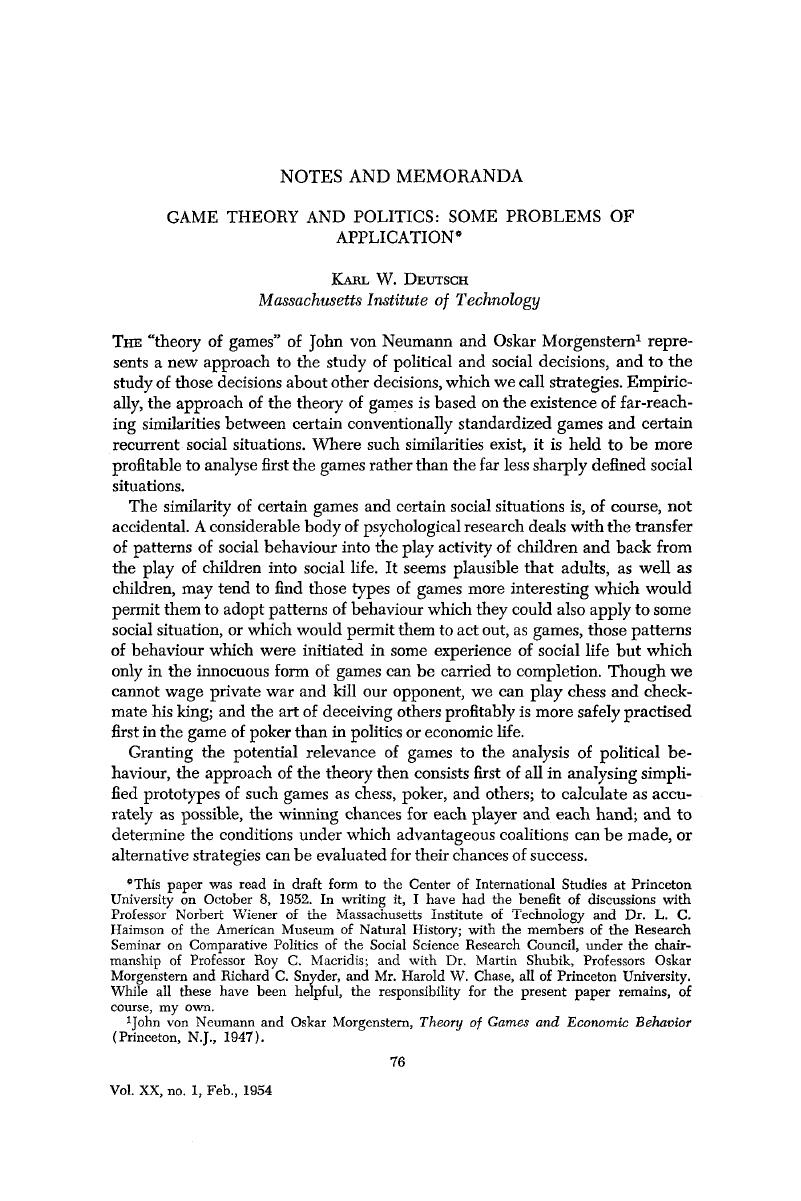Article contents
Game Theory and Politics: Some Problems of Application*
Published online by Cambridge University Press: 07 November 2014
Abstract

- Type
- Notes and Memoranda
- Information
- Canadian Journal of Economics and Political Science/Revue canadienne de economiques et science politique , Volume 20 , Issue 1 , February 1954 , pp. 76 - 83
- Copyright
- Copyright © Canadian Political Science Association 1954
Footnotes
This paper was read in draft form to the Center of International Studies at Princeton University on October 8, 1952. In writing it, I have had the benefit of discussions with Professor Norbert Wiener of the Massachusetts Institute of Technology and Dr. L. C. Haimson of the American Museum of Natural History; with the members of the Research Seminar on Comparative Politics of the Social Science Research Council, under the chairmanship of Professor Roy C. Macridis; and with Dr. Martin Shubik, Professors Oskar Morgenstern and Richard C. Snyder, and Mr. Harold W. Chase, all of Princeton University. While all these have been helpful, the responsibility for the present paper remains, of course, my own.
References
1 von Neumann, John and Morgenstern, Oskar, Theory of Games and Economic Behavior (Princeton, N.J., 1947).Google Scholar
2 Ibid., 38-9.
3 Ibid., 42-3.
4 Ibid., 44-5.
5 Ibid.
6 McDonald, John Dennis, Strategy in Poker, Business and War (New York, 1950).Google Scholar
7 von Neumann, J. and Morgenstern, O., Theory of Games and Economic Behavior, 206.Google Scholar
8 Ibid., 164.
9 Ibid., 30. Italics supplied.
10 Oral communication from Dr. Haimson at the Massachusetts Institute of Technology, spring, 1952; cf. Haimson, L. C., “Soviet Man in a Chess Situation,” in Mead, Margaret, Haimson, L. C., and Smith, Francis R., The Ideal of “Conscious Activity”: Aspects of Decision Making and Communication in Soviet Theory and Practice (New York: Columbia University Research on Contemporary Cultures, American Museum of Natural History, n.d. (1951?), multigraphed), 26–33, with references.Google Scholar
11 This strategy differs significantly from the familiar one of keeping one's opponent “off balance.” To keep an adversary off balance may mean, among other things, to prevent him from committing himself thoroughly to any course of action. The Russian chess strategy, like the warfare of the ancient Parthians, would, on the contrary, encourage the opponent to make such a commitment, in the hope of turning this commitment later to his disadvantage. The latter strategy, unlike the former, can employ deliberate pauses of activity, as well as positive action. The difference between the two strategies resembles thus, in some respects, the difference between boxing and jiu-jitsu.
- 13
- Cited by


